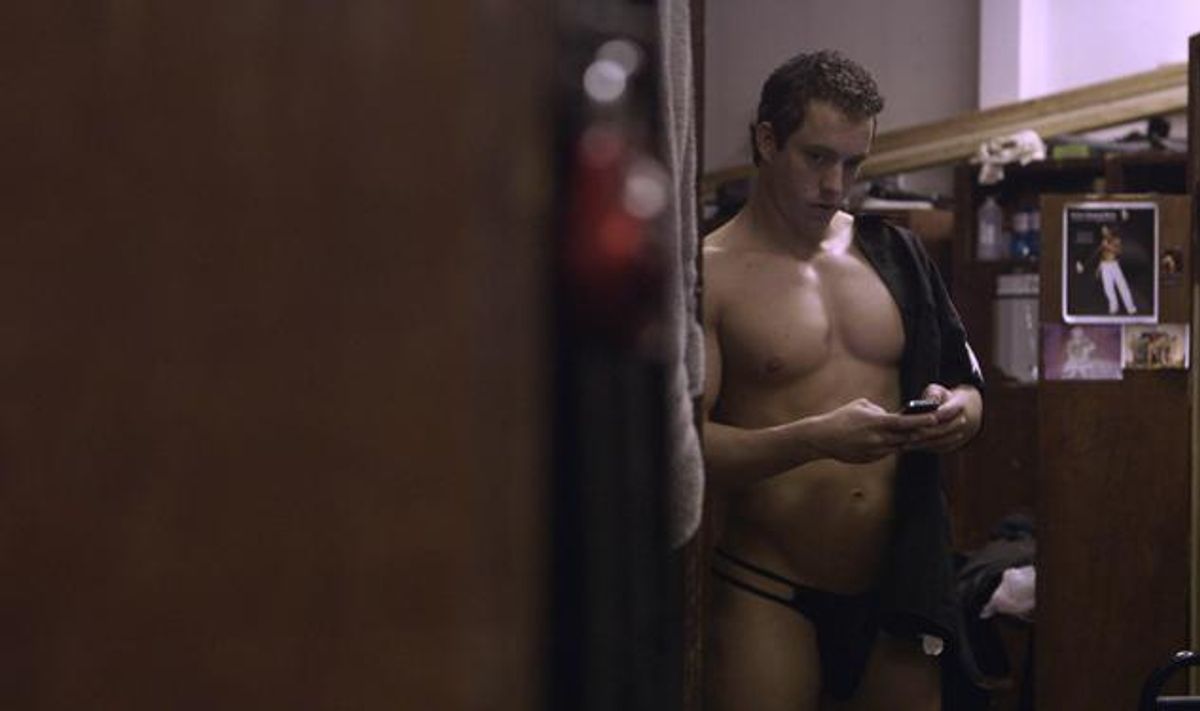
New documentary La Bare reveals All-American male eroticism
June 27 2014 10:20 AM EST
August 16 2017 3:41 AM EST
By continuing to use our site, you agree to our Private Policy and Terms of Use.

New documentary La Bare reveals All-American male eroticism
La Bare, the new strip club documentary, displays enough beefcake to qualify as food porn. It looks at the male stripper subculture through a Dallas nightclub's cast of male dancers. Presumably straight, they put themselves on exhibition for an audience's delectation--aimed at females although one dancer says "I like [dancing for] swingers" because they tip well. The best thing about La Bare is that it differs from the Hollywood film Magic Mike, which displayed famous actors as straight male strippers while pandering to whoever's interested. La Bare is better (not insulting) for its close reveal of men's attitudes about this form of sex work. No doubt go-go boys in gay clubs would tell similar tales about objectifying themselves. La Bare is as much about American masculinity as it is about the enticements of stripping.
Directed by actor Joe Manganiello, whose portrayal of "Big Dick Richie" in Magic Mike was less than arousing (turning his hotness to blandness proved the film was directed by a straight man, Steven Soderbergh), La Bare benefits from what must be Manganiello's realization that a shirtless beefcake career has a short shelf life. He does the honorable thing by showing his empathy for the real lives of dancers like he portrayed in Magic Mike. It turns out Manganiello's actor's compassion is the deep route to an otherwise exploitable, disposable profession. One interviewee confesses "I've gotten so good at my [stage] act that I believed I was really that person." Another says "We all like to have a good time but everyone's got dreams of doing something better." That's when Manganiello cuts to a crumpled dollar bill on a stage floor, better than any Soderbergh shot.
La Bare shows real guys with lives outside Soderbergh's conceit; that's why it surpasses both food porn and mainstream Hollywood soft-core. The opening scenes of two dancers cloned in sleeveless plaid shirts, straw cowboy hats and supple biceps driving to a house call at a bachelorette party is insightful enough to put this fantasy profession in a real world context. (Its truth recalls Ice Cube's fascinating 1996 stripper drama, The Players Club.)
From there, Manganiello briefly recounts the Dallas nightspot's history then quickly gets to the talking heads on the rippling bodies--from co-owner Joe Miller to Russian-born co-owner Alex who wears a pink Hammer-and-Sickle t-shirt; his professional insistence brought in a Vegas choreographer. Alex: "I thought it would be like strippers from '80s doing drugs, wet long hair, always drunk. I'm building up more professional dancers, more to be polite, nice to girls, respect them as they would want to be respected." Manganiello's respect makes the difference from Soderbergh's half-assed sleaze. Fittingly, one dancer gives himself the stage name "Channing" after Magic Mike star Channing Tatum. Described by strip veteran Randy "Master Blaster," he's the one who admits "I love attention, I do. I adore it. I try not to get caught up in it."
Yet "Master Blaster" himself (who wears a Confederate flag thong but got his name from a Stevie Wonder song and Arnold Schwarzengger's trainer Joe Weider) is thoroughly business minded, running a boot camp as much as a stage show. His own medical enhancement recalls the post-op Kenny Rogers but he has more sense--and fatherly wisdom--about stripping than the wrinkled douchebag Matthew McConaughey portrayed in Magic Mike.
Best of all is JD, a blonde average Joe with charm who always keeps things real. "Part of it is just who's better looking. You just gotta get lucky." JD, whose dance shtick is playing a cop, admits "I can't dance at all. I can fuck. Everybody thinks if you can dance you can fuck. If you can't dance you can still fuck." Wesley, La Bare's manager says, "What women want is the show, they want cabaret. They want to be romanced." A female fan informs "Men are like microwaves. Women need to be pre-heated."
Every La Bare worker idolized Angelo, the Latino dancer whose real name was "Ruben" and who was killed in a nightclub scuffle. "[He was] the alpha male. He's got everything. He made the most money and had the best body. The best I'd ever seen. He's 6'3", 230 lbs, shredded, always smilin'. Even guys stared at him like 'Who is this guy?' He was a baseball player, a runner, a football player, a skateboarder, a surfer, an entertainer, a drummer. He was the real Magic Mike." So how come Hollywood made his prototype white? Black dancer "Ace" gets the least screen time, most of it spent praising Angelo/Ruben.
La Bare doesn't resolve such troubling thoughts--that's why it comes short of being great--but at least it raises them. The film's highpoint records an Amateur Night competition as if exploring every man's fantasy of possessing such enormous potency that he can seduce an entire room. Good testimonies from Afghanistan war veteran Cesar, and La Bare's DJ, Nick Adams, who spins discs after his dancing prime, situate these dancers in touching, funny All-American normalcy. But it's JD who summarizes a dancer's social status: "Who knows? Maybe because we're dancers, strippers. Nobody likes strippers." The value of La Bare is that Manganiello proves JD mistaken.
La Bare is in select theaters now.
Beware of the Straightors: 'The Traitors' bros vs. the women and gays